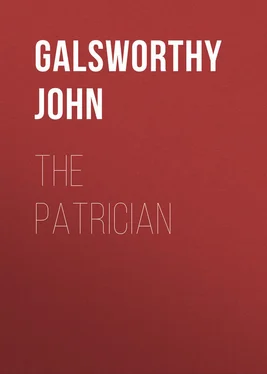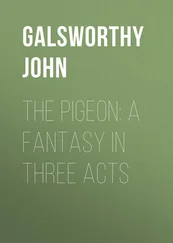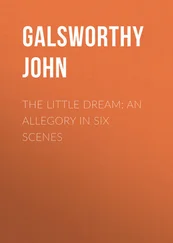John Galsworthy - The Patrician
Здесь есть возможность читать онлайн «John Galsworthy - The Patrician» — ознакомительный отрывок электронной книги совершенно бесплатно, а после прочтения отрывка купить полную версию. В некоторых случаях можно слушать аудио, скачать через торрент в формате fb2 и присутствует краткое содержание. Жанр: foreign_antique, foreign_prose, на английском языке. Описание произведения, (предисловие) а так же отзывы посетителей доступны на портале библиотеки ЛибКат.
- Название:The Patrician
- Автор:
- Жанр:
- Год:неизвестен
- ISBN:нет данных
- Рейтинг книги:5 / 5. Голосов: 1
-
Избранное:Добавить в избранное
- Отзывы:
-
Ваша оценка:
- 100
- 1
- 2
- 3
- 4
- 5
The Patrician: краткое содержание, описание и аннотация
Предлагаем к чтению аннотацию, описание, краткое содержание или предисловие (зависит от того, что написал сам автор книги «The Patrician»). Если вы не нашли необходимую информацию о книге — напишите в комментариях, мы постараемся отыскать её.
The Patrician — читать онлайн ознакомительный отрывок
Ниже представлен текст книги, разбитый по страницам. Система сохранения места последней прочитанной страницы, позволяет с удобством читать онлайн бесплатно книгу «The Patrician», без необходимости каждый раз заново искать на чём Вы остановились. Поставьте закладку, и сможете в любой момент перейти на страницу, на которой закончили чтение.
Интервал:
Закладка:
“Ever since she was a child. Anyone who speaks evil of her, has to reckon with me.”
The man with the refined face said earnestly:
“Believe me, Mr. Courtier, I entirely sympathize. We had nothing to do with the paragraph. It’s one of those incidents where one benefits against one’s will. Most unfortunate that she came out on to the green with Lord Miltoun; you know what people are.”
“It’s the head-line that does it;” said the third Committee-man; “they’ve put what will attract the public.”
“I don’t know, I don’t know,” said the little-eyed man stubbornly; “if Lord Miltoun will spend his evenings with lonely ladies, he can’t blame anybody but himself.”
Courtier looked from face to face.
“This closes my connection with the campaign,” he said: “What’s the address of this paper?” And without waiting for an answer, he took up the journal and hobbled from the room. He stood a minute outside finding the address, then made his way down the street.
CHAPTER VIII
By the side of little Ann, Barbara sat leaning back amongst the cushions of the car. In spite of being already launched into high-caste life which brings with it an early knowledge of the world, she had still some of the eagerness in her face which makes children lovable. Yet she looked negligently enough at the citizens of Bucklandbury, being already a little conscious of the strange mixture of sentiment peculiar to her countrymen in presence of herself – that curious expression on their faces resulting from the continual attempt to look down their noses while slanting their eyes upwards. Yes, she was already alive to that mysterious glance which had built the national house and insured it afterwards – foe to cynicism, pessimism, and anything French or Russian; parent of all the national virtues, and all the national vices; of idealism and muddle-headedness, of independence and servility; fosterer of conduct, murderer of speculation; looking up, and looking down, but never straight at anything; most high, most deep, most queer; and ever bubbling-up from the essential Well of Emulation.
Surrounded by that glance, waiting for Courtier, Barbara, not less British than her neighbours, was secretly slanting her own eyes up and down over the absent figure of her new acquaintance. She too wanted something she could look up to, and at the same time see damned first. And in this knight-errant it seemed to her that she had got it.
He was a creature from another world. She had met many men, but not as yet one quite of this sort. It was rather nice to be with a clever man, who had none the less done so many outdoor things, been through so many bodily adventures. The mere writers, or even the ‘Bohemians,’ whom she occasionally met, were after all only ‘chaplains to the Court,’ necessary to keep aristocracy in touch with the latest developments of literature and art. But this Mr. Courtier was a man of action; he could not be looked on with the amused, admiring toleration suited to men remarkable only for ideas, and the way they put them into paint or ink. He had used, and could use, the sword, even in the cause of Peace. He could love, had loved, or so they said: If Barbara had been a girl of twenty in another class, she would probably never have heard of this, and if she had heard, it might very well have dismayed or shocked her. But she had heard, and without shock, because she had already learned that men were like that, and women too sometimes.
It was with quite a little pang of concern that she saw him hobbling down the street towards her; and when he was once more seated, she told the chauffeur: “To the station, Frith. Quick, please!” and began:
“You are not to be trusted a bit. What were you doing?”
But Courtier smiled grimly over the head of Ann, in silence.
At this, almost the first time she had ever yet encountered a distinct rebuff, Barbara quivered, as though she had been touched lightly with a whip. Her lips closed firmly, her eyes began to dance. “Very well, my dear,” she thought. But presently stealing a look at him, she became aware of such a queer expression on his face, that she forgot she was offended.
“Is anything wrong, Mr. Courtier?”
“Yes, Lady Barbara, something is very wrong – that miserable mean thing, the human tongue.”
Barbara had an intuitive knowledge of how to handle things, a kind of moral sangfroid, drawn in from the faces she had watched, the talk she had heard, from her youth up. She trusted those intuitions, and letting her eyes conspire with his over Ann’s brown hair, she said:
“Anything to do with Mrs. N – ?” Seeing “Yes” in his eyes, she added quickly: “And M – ?”
Courtier nodded.
“I thought that was coming. Let them babble! Who cares?”
She caught an approving glance, and the word, “Good!”
But the car had drawn up at Bucklandbury Station.
The little grey figure of Lady Casterley, coming out of the station doorway, showed but slight sign of her long travel. She stopped to take the car in, from chauffeur to Courtier.
“Well, Frith! – Mr. Courtier, is it? I know your book, and I don’t approve of you; you’re a dangerous man – How do you do? I must have those two bags. The cart can bring the rest… Randle, get up in front, and don’t get dusty. Ann!” But Ann was already beside the chauffeur, having long planned this improvement. “H’m! So you’ve hurt your leg, sir? Keep still! We can sit three… Now, my dear, I can kiss you! You’ve grown!”
Lady Casterley’s kiss, once received, was never forgotten; neither perhaps was Barbara’s. Yet they were different. For, in the case of Lady Casterley, the old eyes, bright and investigating, could be seen deciding the exact spot for the lips to touch; then the face with its firm chin was darted forward; the lips paused a second, as though to make quite certain, then suddenly dug hard and dry into the middle of the cheek, quavered for the fraction of a second as if trying to remember to be soft, and were relaxed like the elastic of a catapult. And in the case of Barbara, first a sort of light came into her eyes, then her chin tilted a little, then her lips pouted a little, her body quivered, as if it were getting a size larger, her hair breathed, there was a small sweet sound; it was over.
Thus kissing her grandmother, Barbara resumed her seat, and looked at Courtier. ‘Sitting three’ as they were, he was touching her, and it seemed to her somehow that he did not mind.
The wind had risen, blowing from the West, and sunshine was flying on it. The call of the cuckoos – a little sharpened – followed the swift-travelling car. And that essential sweetness of the moor, born of the heather roots and the South-West wind, was stealing out from under the young ferns.
With her thin nostrils distended to this scent, Lady Casterley bore a distinct resemblance to a small, fine game-bird.
“You smell nice down here,” she said. “Now, Mr. Courtier, before I forget – who is this Mrs. Lees Noel that I hear so much of?”
At that question, Barbara could not help sliding her eyes round. How would he stand up to Granny? It was the moment to see what he was made of. Granny was terrific!
“A very charming woman, Lady Casterley.”
“No doubt; but I am tired of hearing that. What is her story?”
“Has she one?”
“Ha!” said Lady Casterley.
Ever so slightly Barbara let her arm press against Courtiers. It was so delicious to hear Granny getting no forwarder.
“I may take it she has a past, then?”
“Not from me, Lady Casterley.”
Again Barbara gave him that imperceptible and flattering touch.
“Well, this is all very mysterious. I shall find out for myself. You know her, my dear. You must take me to see her.”
Читать дальшеИнтервал:
Закладка:
Похожие книги на «The Patrician»
Представляем Вашему вниманию похожие книги на «The Patrician» списком для выбора. Мы отобрали схожую по названию и смыслу литературу в надежде предоставить читателям больше вариантов отыскать новые, интересные, ещё непрочитанные произведения.
Обсуждение, отзывы о книге «The Patrician» и просто собственные мнения читателей. Оставьте ваши комментарии, напишите, что Вы думаете о произведении, его смысле или главных героях. Укажите что конкретно понравилось, а что нет, и почему Вы так считаете.












